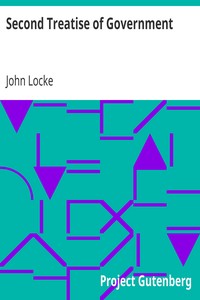Second Treatise of Government by John Locke
"Second Treatise of Government" by John Locke is a political philosophy work published in 1689. Writing anonymously during England's turbulent revolution, Locke outlines a radical vision of society founded on natural rights and government by consent rather than divine authority. His ideas challenge the established order, arguing that legitimate power flows from the people, not kings claiming God-given rule. This foundational text of liberal political theory emerged from dangerous conspiracies and exile,
so controversial that Locke never acknowledged authorship during his lifetime. (This is an automatically generated summary.)
Read or download for free
| How to read | Url | Size | |||
|---|---|---|---|---|---|
| Read now! | https://www.gutenberg.org/ebooks/7370.html.images | 343 kB | |||
| EPUB3 (E-readers incl. Send-to-Kindle) | https://www.gutenberg.org/ebooks/7370.epub3.images | 213 kB | |||
| EPUB (older E-readers) | https://www.gutenberg.org/ebooks/7370.epub.images | 212 kB | |||
| EPUB (no images, older E-readers) | https://www.gutenberg.org/ebooks/7370.epub.noimages | 200 kB | |||
| Kindle | https://www.gutenberg.org/ebooks/7370.kf8.images | 387 kB | |||
| older Kindles | https://www.gutenberg.org/ebooks/7370.kindle.images | 364 kB | |||
| Plain Text UTF-8 | https://www.gutenberg.org/ebooks/7370.txt.utf-8 | 331 kB | |||
| Download HTML (zip) | https://www.gutenberg.org/cache/epub/7370/pg7370-h.zip | 188 kB | |||
| There may be more files related to this item. | |||||
Similar Books
About this eBook
| Author | Locke, John, 1632-1704 |
|---|---|
| Title | Second Treatise of Government |
| Note | Wikipedia page about this book: en.wikipedia.org/wiki/Two_Treatises_of_Government |
| Credits | Dave Gowan and Chuck Greif |
| Reading Level | Reading ease score: 33.4 (College-level). Difficult to read. |
| Language | English |
| LoC Class | JC: Political science: Political theory |
| Subject | Political science -- Early works to 1800 |
| Subject | Toleration -- Early works to 1800 |
| Subject | Liberty -- Early works to 1800 |
| Category | Text |
| EBook-No. | 7370 |
| Release Date | Jan 1, 2005 |
| Most Recently Updated | Dec 25, 2021 |
| Copyright Status | Public domain in the USA. |
| Downloads | 14238 downloads in the last 30 days. |
| Project Gutenberg eBooks are always free! | |

